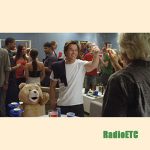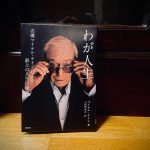ノン・ネイティブだから教えられること ルシア先生(祖師谷大蔵) ETCマンツーマン英会話
<<休止・帰国された先生のページです>>
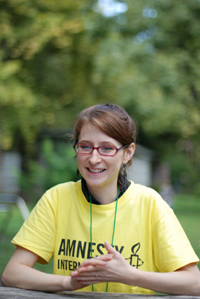 (*)引越の為、受付終了しました。
(*)引越の為、受付終了しました。
Q: 出身地と子どもの頃のお話しを聞かせてください。
スロバキアで生れました。都市部の出身なのですが、でも、東京と比べるとずっと小さな町です。多分、八王子か姫路ぐらいでしょうか。私の世代は子どもだった頃、たいてい田舎に家族や祖父母の実家や別荘がありました。夏休みや冬休み、そしてイースター休暇には、そのほとんどを田舎の祖父母の家に私は行って、村の暮らしの中で時間を過ごしたものです。当時それは、それほど楽しいことは思いませんでしたし、特別のことでもありませんでした。でも、今は違った見方をするようになってきました。畑で自分が食べるトマトを摘むなんてことは、現在では本当に難しくなりましたから。市場で手に取るぐらいですね。自然の中で育っている果物や野菜に、私たちが直に触れる機会はなくなってしまいました。ですから今は、とても貴重な体験だったと、思うようになりました。
I was born in Slovakia. I say I am from a city. But it’s not a city like Tokyo. It’s a lot smaller.It’s perhaps more like Hachiouji or Himeji – quite a small city. Yet, most kids of my generation, have family – usually grandparents – living somewhere in the countryside, or have a summer house (a 別荘) in the countryside. Also in my case, most of summer holiday, winter holiday, Easter holiday, I always used to go to my grandparents’ house in the countryside. I was used to spending my holiday time in the garden or, in general, in village environment. At that time, I didn’t really find very exciting. It wasn’t that special. But now when I think about it from different prospective, it was very special, because now it’s so difficult to simply go to the garden and pick your own fresh fruits and vegetables whenever you want, for instance. You just go to the supermarket. You don’t have contact with fresh vegetables, fruit etc. You just don’t have that contact with nature in general, anymore. So when I think about it now, it was indeed a very special experience.
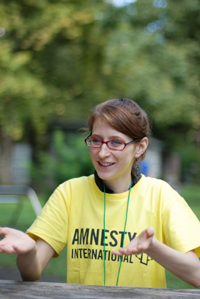 Q: 英語を話すようになった経緯と、先生になられた理由を教えてください。
Q: 英語を話すようになった経緯と、先生になられた理由を教えてください。
いい質問ですね。私は英語のネイティブスピーカーではありませんからね。私が14歳の時、母親がブラッセルで働いていたために、突然ベルギーに引越しをすることになりました。そこで3年半暮しました。中学校の終わりの頃です。私はインターナショナル・スクールに編入しました。私にとって本当に新しい体験でした。実は当時、私は上手く英語が話せなかったのです。大きなショックを受けました。幼稚園のころから英語は勉強していたいのですが、ベルギーで入学したインターナショナル・スクールの最初の授業で、私は何も理解ができなかったのです。
That’s a good question. As you know, I am not a native. But when I was 14, I moved to Belgium because my mother got a job in Brussels. We stayed there for 3 years and a half, and during that time, I was enrolled at an international school (it was at the end of junior high school, and high school). Everything was a really new experience for me. And to be honest, at the start I didn’t speak English very well, so it was a complete shock to suddenly start learning everything in English. When I went to the first class, I didn’t understand anything. I mean, of course in Slovakia I had been studying English ever since kindergarten. But after coming to Belgium and encountering life in such an international, English-speaking environment, it was the first time I realized the importance of knowing how to communicate.
Q: 英語で苦労している私たち日本人と同じような体験をされたのですね。
そうなんです。ですから英語を話そうと努力をしたり、上達せずに悩んでいる日本人の方を見ると、その気持ちが本当に良く分かるのです。私自信も同じ体験をしてきましたので。英語を話す上で、私自身が役に立ったアドバイスを、今度は日本人の方に教えてあげることができる。そう思ったことが、英語の先生になった理由だと思います。
Yes, I was in the very same situation as many Japanese are when they find themselves in an international environment. So when I see Japanese people trying or having difficulties in speaking English, I can truly understand their feeling, because when I was first forced to use English in school, I was experiencing the same anxiety. Indeed, I have gone through the same process as Japanese English-learners, so I feel I can give them advice that helped me in the past. At the same time, I study Japanese language, so I understand the structure of Japanese language, the way of thinking and tendencies in composition, which gives me a lot of insight into the way in which Japanese people construct their speech in English.And that is probably the reason why actually I became an English teacher in Japan.
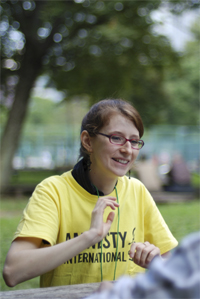 Q: 日本人の生徒さんと同じように英語で苦労した経験があるから、生徒さんが抱える問題や気持ちが分かる。これはノンネイティブ・スピーカーの先生から英語を習う利点でもありますね。
Q: 日本人の生徒さんと同じように英語で苦労した経験があるから、生徒さんが抱える問題や気持ちが分かる。これはノンネイティブ・スピーカーの先生から英語を習う利点でもありますね。
そう思います。もちろんネイティブ・スピーカーの方は母国語については完璧に理解されているでしょう。私のスロバキアの高校にも、たくさんのネイティブ・スピーカーの先生がいらっしゃいました。通常彼らは毎年アメリカやイギリスから来て一年間教えていました。皆とても若く、教えた経験の無い人達ばかりでした。教えるための手法が何も無いんです。授業に来てただ英語を話しているだけ。正直、私は全く理解できなかったですし、何も学びませんでした。もちろんネイティブの先生に教わることは良いことだと思いますが、あるレベル以上になった場合だと思います。初級のうちは、英語以外の言語で説明ができる先生に習うほうがより効果的だと思います。
I think so. In the case of natives, of course they know the language absolutely perfectly. However, if they themselves have not had an experience of learning the structure of their native language or of a foreign language, it might be difficult for them to explain certain concepts, or to anticipate certain mistakes that Japanese English-learners make.For example, when I was in junior high school, we had a lot of native teachers. Usually they came from America or from the Great Britain, for one year at a time. Every year there was a different teacher. But they were generally very young and quite inexperienced in teaching their mother tongue.Even though I was still in junior high school, from their teaching style I felt that they did not use a proper methodology of teaching. They just came to the class, and started speaking English. Nobody understood anything and I we failed to learn much. So I think it is good to have native teachers, but only from a certain level. At the very beginning, I think it’s more useful if you can give explanations in a language other than English, because students just doesn’t understand your English explanations yet.
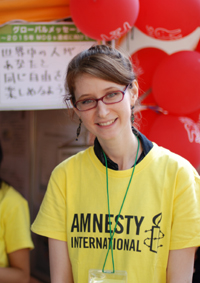 Q: 今日は日比谷公園のグローバル・フェスタ会場で、アムネスティのボランティアとして参加されているところにお邪魔してお話しをお聞きしました。よろしければ、先生の活動についてもお話しください。
Q: 今日は日比谷公園のグローバル・フェスタ会場で、アムネスティのボランティアとして参加されているところにお邪魔してお話しをお聞きしました。よろしければ、先生の活動についてもお話しください。
私がこのようなイベントの参加するのは、実は今日が始めてなのです。アムネスティのボランティアとして活動を始めたのは約1年前。アムネスティは、様々な問題に関して様々な活動を数多く行っています。例えば、死刑制度、ビルマ問題、性別問題など。私は大学で国際関係を専攻しているので、基本的に難民問題に興味があります。この活動を通して、難民問題に何らかの係わりを持てることはとても有意義なことだということに気付きました。
Today is actually the first time that I am involved in this kind of campaign. I started volunteering for Amnesty International quite recently – just about a year ago. In fact, Amnesty is an advocacy group involved in lots of various activities on various issues, for example, campaigns to stop the death penalty, Burma problem or gender issues – all kinds of different campaigns. After coming to Japan, I realized I will finally have time to participate in volunteer activities related to my study (When I was in England I did not have much time). During my university studies, my major was international relations and security studies, so I’ve been taking modules about refugee issues. When I found out that there is a team in Amnesty that focuses on refugees and their problems in Japan, I thought it might be really good to get involved.
以前私は日本の難民問題についてあまり詳しくありませんでした。アムネスティの他のボランティアの方から教えていただたり調査をしたりして、日本の難民制度についての詳細を知ることができました。現時点で日本は、難民の受入数が残念ながら予想以上に少ないのです。日本は国外のODAには多くの貢献をしていますが、国内の難民問題に対しては非常に小さいということはたいへんな驚きです。
Also, I didn’t know so much about the refugee system in Japan before, so I thought it would be a good opportunity to gain an insight into how it works. Since I started getting involved, I learned many new things from other Amnesty members and volunteers, and I found out what the main problem areas are. It’s actually unexpectedly limited. I found out that there are very few refugees in Japan that become officially recognized by the Japanese government. Unfortunately, Japan hasn’t really been open to refugees, even though its contributions in form of ODA to countries outside of its territory are high. It’s quite a paradox that for refugees within its territory, they are actually doing very little. So, participating in Amnesty’s activities has been very stimulating so far.
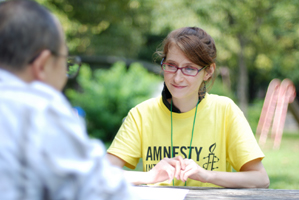 今回、幾つか体験ゲームのようなものも作成してみました。くじ引きはご覧になりましたか。あれは、日本の人口に対する難民の数の割合を表しているんです。日本は1982年に難民会議に出席してその役割を担うことになったのですが、1982年から2009年の約30年の間で受け入れた難民の数は531人のみ。日本人の人口の大きさから比べたらその数がいかに小さなものかを伝えたい。日本で難民に会う確立は、宝くじに当たるよりも小さいということを何かで読んだことがあります。私たちがこのくじ引きを作ったのは、そのことを伝えたいからなのです。
今回、幾つか体験ゲームのようなものも作成してみました。くじ引きはご覧になりましたか。あれは、日本の人口に対する難民の数の割合を表しているんです。日本は1982年に難民会議に出席してその役割を担うことになったのですが、1982年から2009年の約30年の間で受け入れた難民の数は531人のみ。日本人の人口の大きさから比べたらその数がいかに小さなものかを伝えたい。日本で難民に会う確立は、宝くじに当たるよりも小さいということを何かで読んだことがあります。私たちがこのくじ引きを作ったのは、そのことを伝えたいからなのです。
For today’s event, we made a couple of interactive activities as you may have seen. We made a lottery draw box. It is supposed to symbolize the proportion of refugees in Japan. Japan has signed the 1951 Convention relating to the Status of Refugees and the 1967 Protocol in 1981 and 1982 respectively. However, in the 30 years between 1982 and 2009, Japan has only given Convention asylum to 531 refugees. So we are trying to demonstrate this little number via the lottery draw: if you would want to meet a refugee in Japan, the chances would be even smaller than wining a lottery.We feel that this should change, and therefore I find it very stimulating to participate in similar events.









